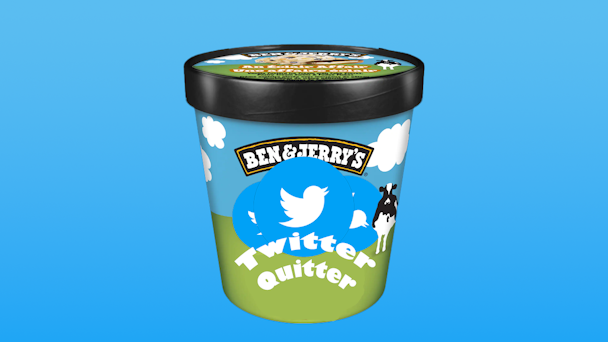Will Unilever follow Ben & Jerry’s decision to halt Twitter spend over hate speech?
With the ice-cream maker suspending its advertising on the platform, we look at likelihood of other brands following suit.

As pressure mounts on Twitter from Ben & Jerry's announcement, what now for the platform's advertising?
Unilever-owned Ben & Jerry’s is the latest company to announce it is pausing ad spend on Twitter, citing a “proliferation of hate speech“ on the platform. While most of the other brands that paused or reduced paid advertising on Twitter did so in the aftermath of Elon Musk’s takeover, Ben & Jerry’s only axed its budgets last week in direct response to a series of brand safety and hate speech issues.
In an announcement posted to the platform itself, the official Ben & Jerry’s Twitter account stated: “The platform has become a threatening and even dangerous space for people from so many backgrounds, including people who are Black, Brown, trans, gay, women, people with disabilities, Jewish, Muslim and the list goes on. This is unconscionable in addition to being plain bad business.”
The ice-cream brand did note that it would maintain a presence on the platform for the time being but stated that even that is subject to review.
Shortly after Ben & Jerry’s published its decision, Twitter’s head of safety Ella Irwin resigned. She had taken over the role following the resignation of the previous head, Yoel Roth, late last year.
Carol Chan, the managing director at marketing agency Comms8, suggests that the brand has used the problems at Twitter as a PR opportunity to reinforce its brand values. She says: “It’s quintessential Ben & Jerry’s, likely generating more impact than traditional paid advertising.
“While I don’t anticipate a blanket adoption of this strategy across Unilever’s other brands, the situation could certainly escalate if Twitter does not address these concerns. The quality of content on the platform has declined, damaging the safe and positive environment brands wish to associate with. If this trend continues, it might encourage more brands to reconsider their advertising investments.“
Advertisement
The Drum has contacted Unilever for a statement on Ben & Jerry’s position, asking whether its other brands (which include Dove, Hellman’s and Axe) will follow its lead. A spokesperson for the FMCG giant declined to comment, however.
Many of its brands have very publicly stated their opposition to hate speech in the past, previously threatening to pull spend from platforms that perpetuate or allow it. Dove in particular has made social purpose a core part of its marketing strategy, having taken a stand against toxic beauty standards on social media.
Ben & Jerry’s is an outlier in the Unilever portfolio, and among subsidiary brands in general, in that independence in its decision-making was built into the terms of its purchase. In 2021, that decision was reflected in the company’s decision to cease trading in occupied Palestinian territories, while it has also published its ’social mission’ of engaging with issues of race and equality.
Advertisement
As a result, while Ben & Jerry’s has relative autonomy, its move to quit Twitter puts pressure on other Unilever brands to at least explain why they continue to advertise on the platform.
“Historically, brands have followed each other on things like this, but often it is short-lived,“ says Jim Coleman, the chief exec of social media agency We Are Social.
“Brands pausing ad spend on YouTube and Twitter has happened in the past, but maybe this time, with the lack of clarity around safety at Twitter, the decline could be longer-term. Twitter’s incoming CEO, Linda Yaccarino, will be keen to move swiftly to stabilize the platform and return confidence to advertisers.“
Ad industry veteran Yaccarino was announced as the new chief executive last month, with industry observers saying she would bring a certain level of confidence to advertisers that have been hesitant to spend on Musk’s new vision for the platform.
The latest news follows another perceived downgrade in Twitter’s value, this time from investment group Fidelity, which values Twitter – in which it has a minority stake – at around $15bn, roughly a third of the price Musk paid for it late last year. It is likely that much of the reason for the decline is the company’s ongoing struggle to onboard ad revenue as a result of brand safety concerns and the firing of a number of key sales staff.

